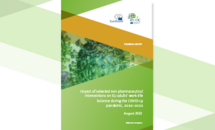Impact of selected non-pharmaceutical interventions on EU adults’ work-life balance during the COVID-19 pandemic
This report summarises results from an analysis conducted by ECDC and Eurofound to understand the impact of selected NPIs introduced from 2020 to 2022 in response to the COVID-19 pandemic on the WLB among EU adults. The report includes information collected by ECDC regarding NPIs and by Eurofound regarding the impact of the pandemic on the work and lives of EU citizens.
Information from all 27 EU Member States was included in the analysis.
Executive Summary
This report investigates the association between a set of selected non-pharmaceutical interventions (NPI), namely stay-at-home orders and recommendations, closure of day-care, primary and secondary schools (closure of educational facilities) and national teleworking recommendations, on adult work-life balance (WLB). The study is set in the 27 European Union (EU) Member States between March 2020 and May 2022. Linked data from the European Foundation for the Improvement of Living and Working Conditions (Eurofound) ‘Living, Working and COVID-19’ e-survey and the European Centre for Disease Prevention and Control (ECDC) and the Joint Research Centre (JRC) Response Measures Database were analysed using logistic regression models, adjusted for socio-demographic and spatial confounders.
This study found that the selected NPIs, implemented in response to the COVID-19 pandemic during the period 2020−2022, significantly affected WLB. On the one hand, these NPIs, particularly the closure of educational facilities and teleworking, reduced the pressure of work on personal and family life by decreasing working time and tiredness from work. On the other hand, the selected NPIs, particularly the stay-at-home policies and teleworking, increased European adults’ propensity to worry about work outside of working hours and, in some instances, reduced their job concentration and dedicated working time due to family responsibilities.
The study findings suggest important differences in how the WLB of specific groups is associated with the above-mentioned NPIs, with certain groups appearing more negatively affected than others. For instance, individuals living with young children appear to have suffered more from the stay-at-home policies and school closures, while benefitting less from teleworking. Conversely, those aged <35 years, those without children at home, those living in the countryside and those living in northern EU countries perceived a positive impact from teleworking policies in terms of their professional-private life conflicts, with a limited or insignificant negative impact on their private-professional life conflicts and the extent to which they worried about work.
Our results also suggest that policies on the introduction of NPIs need to consider ways to reduce the burden of family and care responsibilities and their conflict with working remotely, especially for those living with children <12 years. At the same time, policies perceived as improving professional-private life balance should be explored further, and this could be a fruitful avenue for future research.
Policymakers should include methodologies to monitor the WLB, besides the effectiveness, adherence to and impact of NPIs during their implementation, in order to be able to rapidly adjust NPIs and improve efficacy and compliance while reducing their negative impact. In addition, stronger support arrangements should be considered to improve WLB when planning the implementation of NPIs such





